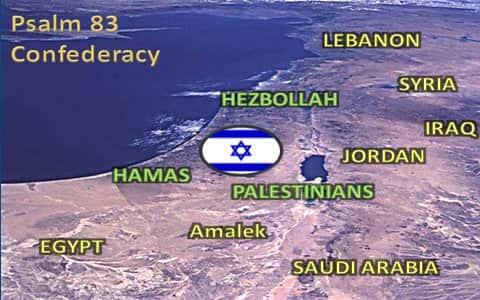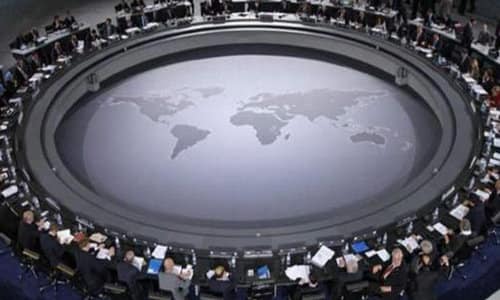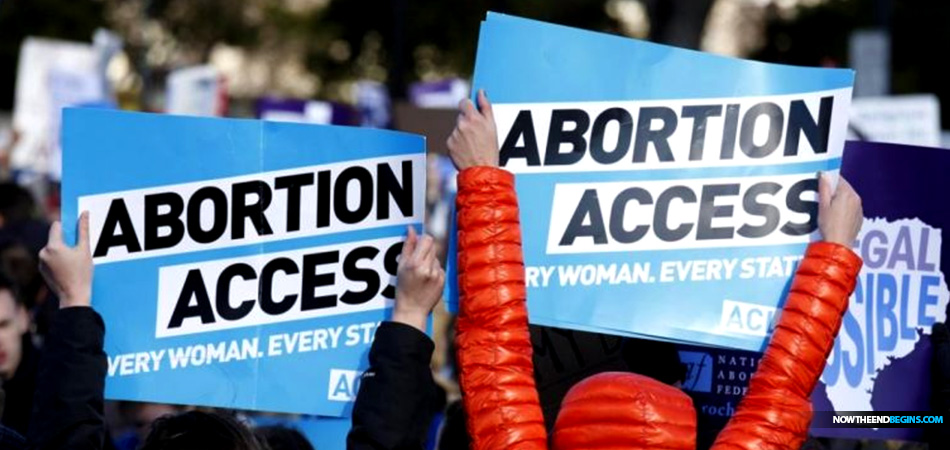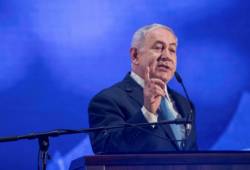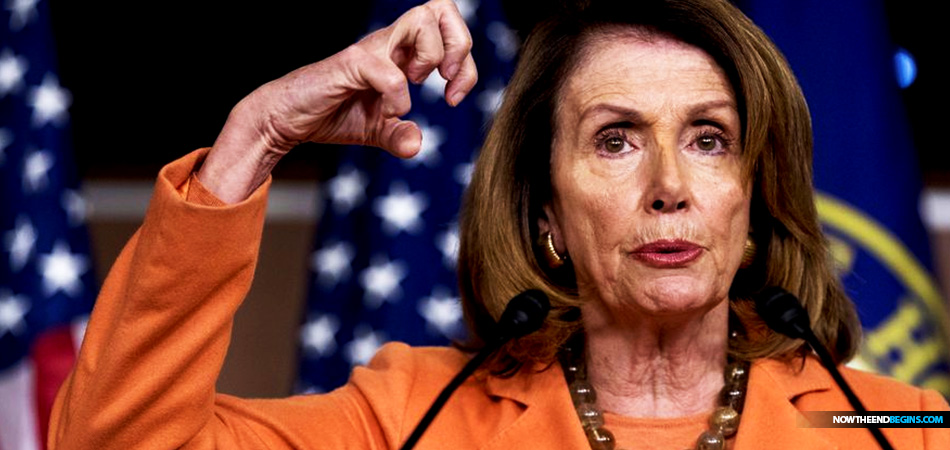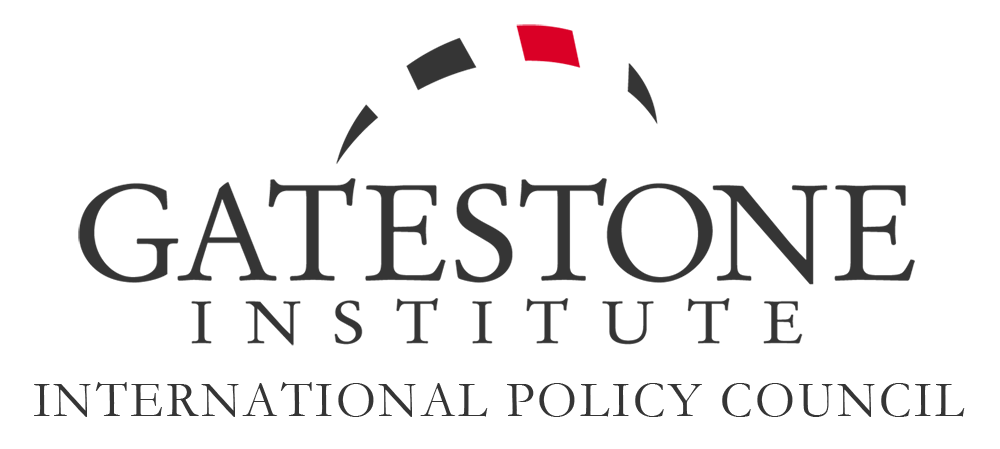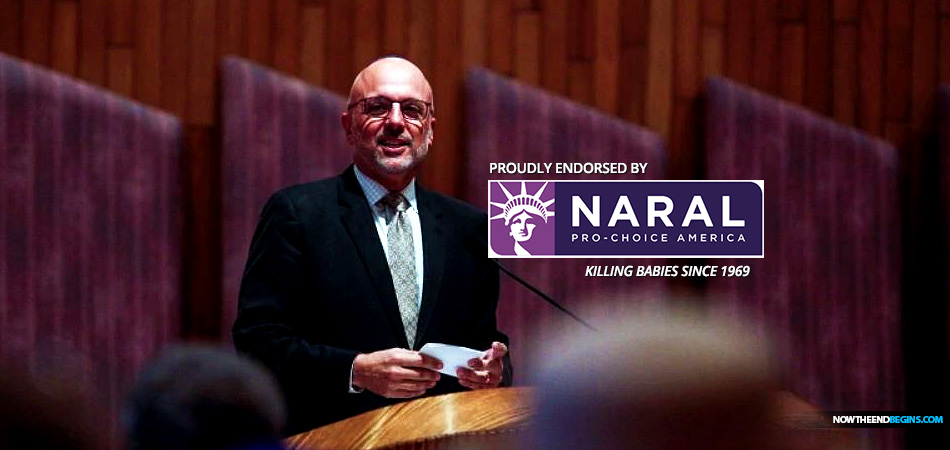by Bassam Tawil • January 29th
According to US Secretary of State Mike Pompeo, an upcoming US-sponsored global summit to discuss the Middle East and Iran will "bring together dozens of countries from all around the world, from Asia, from Africa, from Western Hemisphere countries, Europe too, the Middle East of course."
The Palestinian strategy is now based on inciting Arabs against their leaders. This is the message that Abbas and his officials are sending to the Arabs: "You need to join us in our campaign to stop our leaders from making peace with Israel. You must condemn any leader who seeks normalization with Israel as a traitor."
Other senior Palestinian officials have gone further by warning the Arab countries that any form of normalization with Israel would be considered an act of treason
It now remains to be seen whether the Arab countries will surrender to the latest campaign of Palestinian incitement and intimidation.
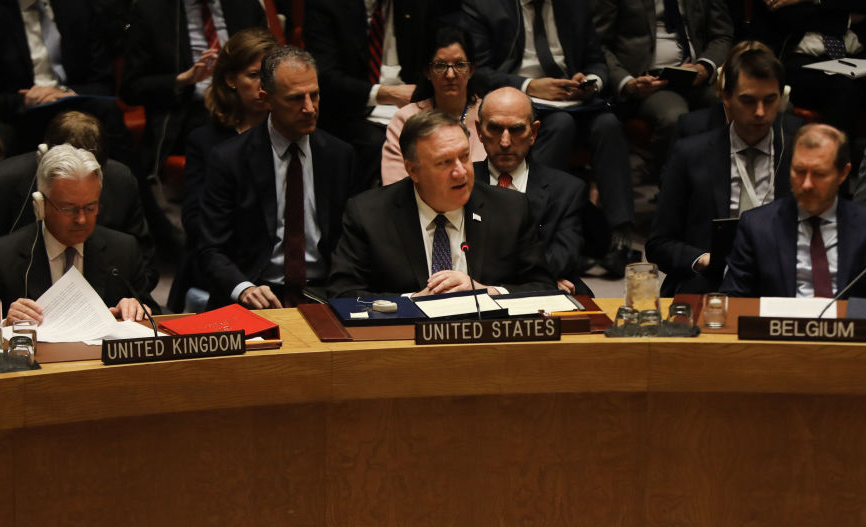
As part of the "anti-normalization" campaign, Palestinian leaders are putting pressure on Arab countries to boycott a US-sponsored global summit to discuss the Middle East and Iran. According to US Secretary of State Mike Pompeo (center), the summit will "bring together dozens of countries from all around the world, from Asia, from Africa, from Western Hemisphere countries, Europe too, the Middle East of course." (Photo by Spencer Platt/Getty Images)
Palestinian leaders have recently stepped up their efforts to stop Arab countries from normalizing their relations -- or even signing peace agreements -- with Israel.
The campaign comes against a backdrop of reports about the warming of relations between Israel and some Arab countries, including a recent visit to Oman by Israeli Prime Minister Benjamin Netanyahu.
The specter of peace between the Arab countries and Israel has become a nightmare for Palestinian leaders. Instead of worrying about building a better future -- which the Palestinians desperately need -- Palestinian leaders are feverishly working to thwart any attempt to bring the Arab countries closer to Israel.
As part of the "anti-normalization" campaign, the Palestinian leaders in the West Bank are now putting pressure on the Arab countries to boycott a US-sponsored global summit to discuss the Middle East and Iran, which is scheduled for next month in Poland.
by Uzay Bulut • January 29th
Erdogan did not hide the fact that his statements promising "freedom of faith, freedom of thought and freedom of opinion" were part of his "preparations for the 2019 local elections." The Turkish president did, however, hide the fact that his words were completely false.
On December 19, Prof. Şebnem Korur Fincancı, president of the Human Rights Foundation of Turkey (TIHV), was sentenced to two and a half years in prison for being one of 2,212 signatories to an "Academics for Peace" petition in 2016. The petition called on the Turkish government to cease its violence against the Kurds in southeastern Turkey. Fincancı is one of 429 academics who, as of December 19, have stood on trial since December 5.
Erdoğan was not telling the truth when he declared that everyone in Turkey would enjoy "freedom of faith, freedom of thought and freedom of opinion." In fact, Turkish jails and prisons are so packed with people imprisoned for expressing their beliefs, that the government just announced it will be building 228 more prisons over the next five years to accommodate the overflow.
Simultaneously, Turkey is stepping up its decades-long bid to become a member of the European Union. As part of this bid, Turkish Justice Minister Abdulhamit Gul announced on December 11 that he would be unveiling a new strategy for judicial reform. Under no circumstances should the EU allow itself to be duped by such a transparently deceptive and deceitful move.
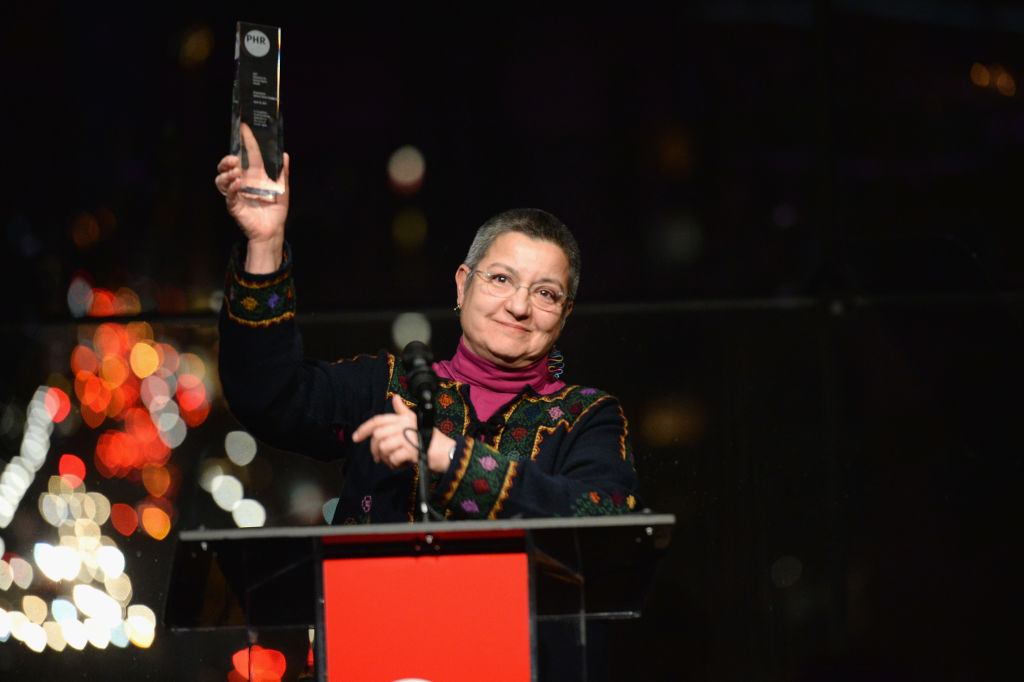
On December 19, Prof. Şebnem Korur Fincancı, president of the Human Rights Foundation of Turkey, was sentenced to two and a half years in prison for being one of 2,212 signatories to an "Academics for Peace" petition, which called on the Turkish government to cease its violence against the Kurds in southeastern Turkey. Pictured: Fincancı receives the Physicians for Human Rights award in New York City on April 18, 2017. (Photo by Andrew Toth/Getty Images for Physicians for Human Rights)
At a rally in Ankara over the summer, held by the women's branch of Turkey's ruling Justice and Development Party (AKP), Turkish President Recep Tayyip Erdoğan announced:
"From now on, there will be no fight for freedom of faith, freedom of thought and freedom of opinion. Everyone will be free in their own faith [and] be free to live accordingly. [Everyone will be at liberty to] say whatever he [or she] believes in."
Erdogan did not hide the fact that his statements at the August gathering were part of his "preparations for the 2019 local elections," scheduled for March 31. The Turkish president did, however, hide the fact that his words were completely false. To illustrate, let us review some of the human-rights abuses in Erdoğan's Turkey that took place in one month, December 2018, alone.
by Khaled Abu Toameh • January 29th
If, in the eyes of the Palestinian Authority (PA) leadership, normalization with Israel is an act of "treason," a "crime" and a "big political and national sin," the Trump administration may well be wasting its time and prestige on a peace plan that envisions peace between the Arab countries and Israel, at least at this time.
To achieve peace with Israel, Palestinian leaders need to prepare their people -- and all Arabs and Muslims -- for peace and compromise with Israel, and not, as they are now doing, the exact opposite. Shaming and denouncing Arabs who visit Israel is hardly a way to prepare anyone for peace, or the possibility of any compromise.
Meanwhile, the Trump administration and the international community would be doing a real service to the Palestinians if they start paying attention to assaults on public freedoms, including freedom of the media, in the West Bank and Gaza Strip. Holding Palestinian leaders accountable for their systematic abuses of public freedoms, assaults on journalists and incitement is the only way to encourage badly needed moderate and pragmatic Palestinians and Arabs to speak out.

While the Palestinian Authority continues to arrest and intimidate Palestinian journalists in the West Bank, its loyalists are also waging a campaign against Arab journalists who dare to visit Israel. (Image source: iStock)
While the Palestinian Authority (PA) continues to arrest and intimidate Palestinian journalists in the West Bank, its loyalists are also waging a campaign against Arab journalists who dare to visit Israel.
This month alone, the PA security forces have arrested nine Palestinian journalists, according to the Palestinian Committee for Supporting Journalists.
One of the journalists, Yousef al-Faqeeh, 33, a reporter for the London-based Quds Press News Agency, was taken into custody on January 16. On January 27, a PA court ordered al-Faqeeh remanded into custody for 14 days. His family said that they still do not know why he was arrested.
Al-Faqeeh's wife, Suhad, said that PA security officers raided their house; when Yousef asked whether they had a search warrant, they proceeded to arrest him. "They took him to an unknown destination and did not provide a reason for his arrest," she said. "They also confiscated his computer and mobile phone."
by Uzay Bulut • January 29th
"Anyone who studies and researches our faith a little bit would understand that. Alevism is a distinct faith. Alevism has been affected by Christianity, as well. Does that make [it] a branch of Christianity? And Islam has been affected by Judaism. Is Islam a branch of Judaism?" -- Zeynep Arslan, Vice-President of the Austrian Federation of Alevi Unions.
"Although the officials of the lands where we live have signed agreements of international law, they never implement what is required by the law. Our religious rights and freedoms are guaranteed by international law, but our places of worship, cem houses, are not recognized [by the government]; our taxes are collected without our consent to be used to pay the salaries of imams who reject or insult us... Alevi school children still have to enroll in compulsory Islamic courses, in spite of rulings by the European Court of Human Rights." – Public statement by Alevi leaders in Turkey, in support of the Austrian Federation of Alevi Unions, January 3, 2019.
Alevis have been suffering from Islamic intolerance in their home country, Turkey, for a century. They are now struggling against rising Islamic supremacism in Europe. Let us hope that Austria's high court does the right thing this week and accepts their petition to be recognized as a distinct faith.
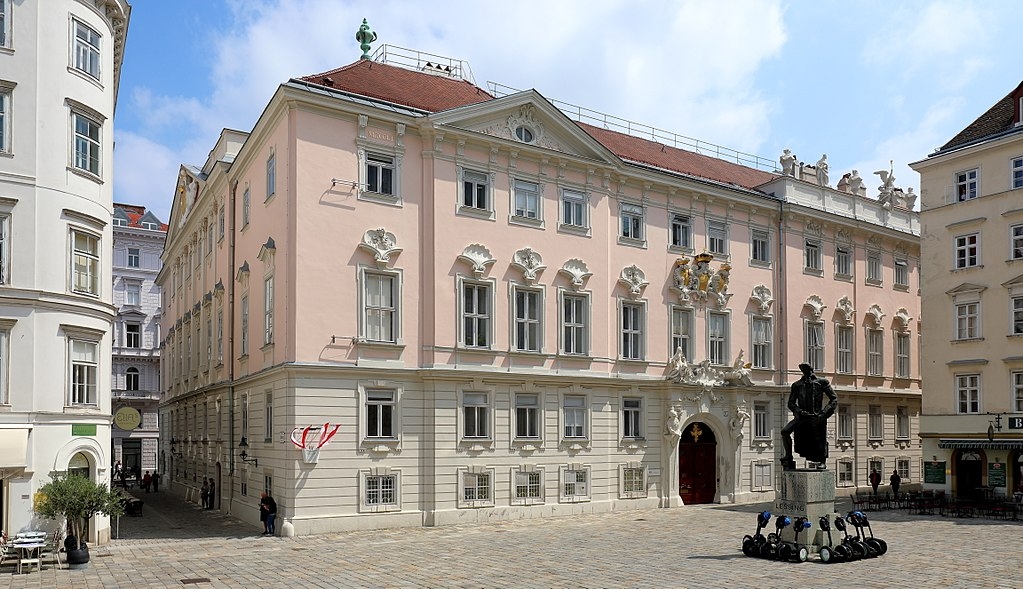
The Austrian Supreme Administrative Court is set to issue a ruling on a petition by the Austrian Federation of Alevi Unions to have their religion officially recognized as separate from Islam. Pictured: The Supreme Administrative Court building in Vienna. (Image source: Bwag/Wikimedia Commons)
The Austrian Supreme Administrative Court is set to issue a ruling on a petition by the Austrian Federation of Alevi Unions to have their religion officially recognized as separate from Islam -- and not part of the updated version of the 1912 Islam Law, which went into effect in 2015. The new law recognizes two "Islamic religious societies" -- the Islamic Community in Austria, which represents Islam's Sunni sects, and the Islamic Alevi Community in Austria, which is defined as an "Islamic sect."
Austrian Federation of Alevi Unions president, Özgür Turak, told Gatestone about the legal struggle for official recognition of Alevism as distinct from Islam:
by Jagdish N. Singh • January 29th
The All India Muslim Personal Law Board has argued that the bill amounts to interference with religious law, and therefore violates the Constitution of India. This objection might be thought of as disingenuous. According to Article 44 of the Constitution, "The State shall endeavour to secure for the citizens a uniform civil code throughout the territory of India."
By contrast, triple talaq is a unilateral, arbitrary tool in the hands of men against women, a condition what that is simply not acceptable in modern India.
For decades, Indian courts have upheld the precedence of Muslim women's right to equality over Muslim Personal Law. The court ruled in 1985 that the denial of alimony was a violation of Bano's fundamental rights, regardless of her religion, and that triple talaq ran contrary to those rights. In other words, Muslim women must enjoy the same rights as other women in India.
India's Parliament must do the right thing for the country's Muslim women, as it did nearly 64 years ago for the country's Hindu women. Until the passage of the Hindu Marriage Act, 1955, Hindu women in India were not at liberty to divorce their husbands, while Hindu men were free to engage in polygamy. It will be a shattering miscarriage of justice if oppositionist politicians succeed in blocking this much-needed bill.
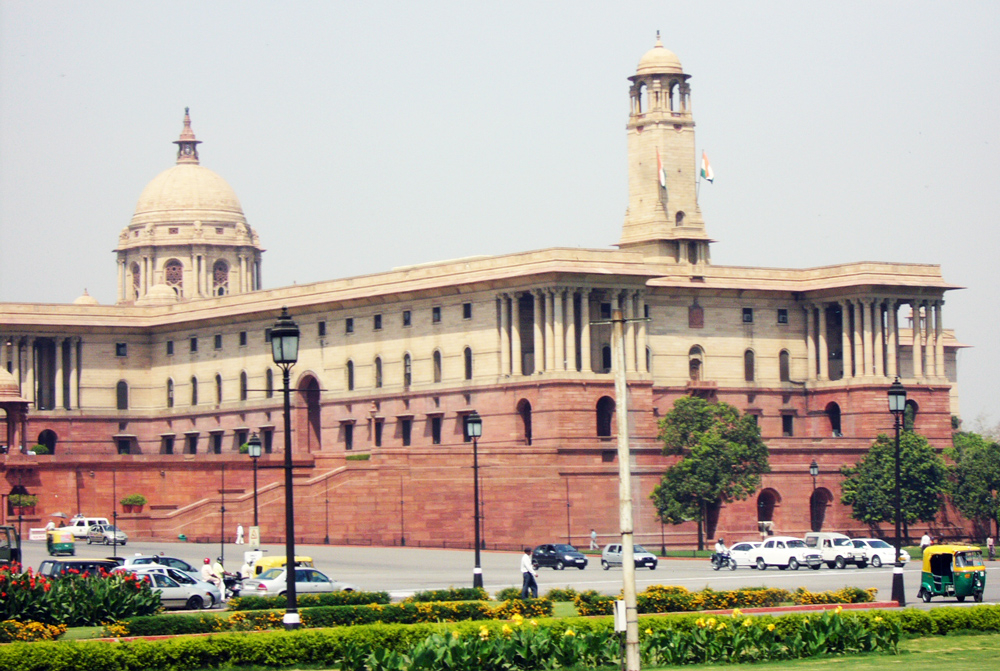
The Indian Parliament building in New Delhi. (Image source: Shahnoor Habib Munmun/Wikimedia Commons)
The Narendra Modi government in New Delhi deserves applause for passing the Muslim Women (Protection of Rights on Marriage) Bill, 2018, which criminalizes the practice of "triple talaq" -- a medieval, patriarchal divorce procedure still in use in many Muslim communities in India and abroad. All this procedure requires for a man to divorce his wife is to repeat the word "talaq" three times.
In order for the bill -- passed by India's Lower House of Parliament (Lok Sabha) on December 27, 2018 -- to be written into Indian law, it needs approval by the Parliament's Upper House (Rajya Sabha).
In an attempt to keep this from happening, radical Islamist groups, such as the All India Muslim Personal Law Board (AIMPLB), are attempting to join forces with opposition parties to torpedo the bill. Oppositionists on the left have accused the bill of violating fundamental human rights and of constituting "an assault on the Muslim family structure."
|
|
